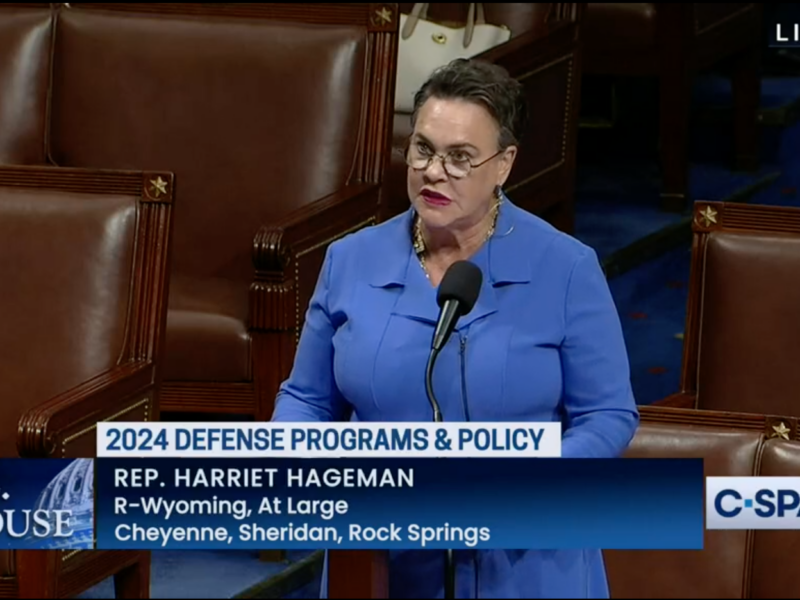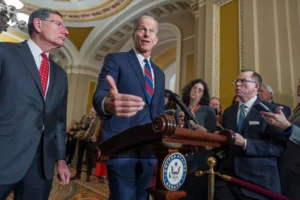House Narrowly Passes Defense Bill With Restrictive Social Policies, Imperiling Senate Prospects
Republicans pushed through limits on abortions, gender transition care and diversity trainings in the military
- Published In: Politics
- Last Updated: Jul 15, 2023

Rep. Harriet Hageman (R-Wyo.) spoke on the House floor Thursday in support of her measure requiring Pentagon leaders to share documents about the military's Countering Violent Extremism program that has come under fire from conservatives for alleged bias. (Photo via C-SPAN).
By Jacob Gardenswartz
Special to the Wyoming Truth
WASHINGTON — The U.S. House on Friday narrowly passed the 2024 National Defense Authorization Act (NDAA), the annual bill establishing military funding levels and American defense policy for the coming fiscal year. But the typically bipartisan legislation was mired in partisanship as Republican leaders, still stinging from conservatives’ ire over a debt limit compromise agreed to months ago, allowed right-wing lawmakers to introduce controversial amendments impacting abortion, transgender care and diversity trainings.
The legislation cleared the House almost exclusively with GOP support: four Democrats broke rank to back its passage and an equal number of Republicans opposed it, bringing the final vote tally to 219–210. At the Capitol on Friday, House leaders including Speaker Kevin McCarthy (R-Calif.) celebrated the bill’s passage, touting the 5% raise it provides service members and the restrictive social policies within it.
“A military cannot defend themselves if you train them in woke,” McCarthy told reporters at a post-vote press conference. “We don’t want Disneyland to train our military. We want our men and women in the military to have every defense possible, and that’s what our bill does.”
Democrats denounced the inclusion of social measures, arguing that they undermine the nation’s military readiness.
“This bill has been transformed into an extremist manifesto,” Minority Whip Katherine Clarke (D-Mass.), the number two Democrat in the House, said on CNN Friday morning. “We know that this bill is going nowhere in the Senate because it is disgusting and outrageous.”
Partisan legislation is unlikely to garner much support in the Democratically-controlled Senate, where Majority Leader Chuck Schumer (D-N.Y.) has said votes on the upper chamber’s version will begin next Tuesday.

If the Senate’s version emerges significantly more moderate in nature, as is expected, McCarthy will face another uphill battle: convincing the far-right lawmakers who pushed for the restrictive social policies to reverse course and back legislation without their inclusion. So far, they haven’t shown any interest in doing so.
“We are not going to relent. We are not going to back down. We’re not going to give up on the cause that is righteous,” Rep. Scott Perry (R-Penn.), chairman of the House Freedom Caucus, told reporters. “We’ll see what [the senators] come up with.”
In NDAA, Hageman’s ‘anti-woke’ caucus flexes nascent power
Policy debates over the NDAA are nothing new; the must-pass bill has frequently drawn lawmakers into conflicts over issues ranging from domestic terrorism to prisoners’ indefinite detention.
But the degree to which debate over this year’s bill has ensnared hotbed social issues is novel, as is the amount of intra-party concern the measures are causing for Republicans. Vulnerable lawmakers representing more moderate districts were forced to cast votes on a range of controversial issues, all but ensuring their decisions will be used in future attack ads.
Central to the push for inclusion of the controversial measures was Wyoming Rep. Harriet Hageman and the so-called “anti-woke caucus,” a group of roughly 25 right-wing lawmakers who have prioritized “root[ing] out all far-left political programs from the federal government.”
The group and their allies brought forward a series of amendments aimed at striking down current military policies, stretching votes late into the night Thursday and early Friday morning. Ultimately, lawmakers blocked the Pentagon from paying for or reimbursing expenses related to abortion services for service members, prohibited military health programs from covering transgender services like hormones and surgeries, banned displays of LGBTQ pride flags and eliminated all offices and personnel working on diversity, equity and inclusion initiatives within the military.
Hageman sponsored or signed onto several amendments attached to the bill, including one which mandates military leaders share with Congress all communications and documents pertaining to a Pentagon initiative aimed at countering domestic extremism — a program that has come under fire from some alleging anti-conservative bias.
“I hope there is nothing there,” Hageman said on the House floor Thursday evening, urging her colleagues to support the amendment. “But without confirming this through the evidence, I cannot trust that the Biden administration and the DoD under Secretary [Lloyd] Austin did the right thing, simply because they have failed to earn the trust of the American people due to routine exposure of wrongdoing and abuse.”
Despite forceful pushback from Democrats — Rep. Pat Ryan (D-N.Y.), a former military intelligence officer himself, said Hageman’s proposal “politicizes” bipartisan work aimed at countering extremism — it narrowly passed, 218–213.
“This bill is nothing more than related to transparency and oversight,” Hageman concluded.
Republicans split on support for Ukraine
Lawmakers also were forced to vote on amendments seeking to curtail America’s support for Ukraine amid the war against Russia, a topic which has split Republicans in recent months.
Most of the measures, including three that would have explicitly limited funding for the Ukrainian war, failed, as did another attempt to prohibit President Joe Biden’s transfer of controversial cluster munitions to the war-torn nation. Hageman supported all such measures, cementing her alignment with the more anti-interventionist wing of the GOP— in contrast to her predecessor Liz Cheney.
But though the more direct measures to limit support for Ukraine failed, several Hageman-backed policies providing for greater oversight of America’s role in the war succeeded.
“I am confident that my four amendments which have been included in this legislation will ensure greater transparency, oversight, and accountability from the DoD,” she said in a statement celebrating the bill’s passage.
What comes next?
The NDAA bill as it currently stands has virtually no chance of passage in the Senate.
Schumer has promised to allow votes on a “reasonable number” of amendments, though it’s unlikely the controversial social policies will be among them. Senators have filed upwards of 650 amendments, and leaders in both parties are now working to decide which ones will be brought up for consideration.
Wyoming Sens. John Barrasso and Cynthia Lummis have proposed several amendments to the NDAA. Barrasso’s proposals concern energy security and limiting support for the Chinese government, while Lummis’ measures were not yet public as of Friday evening.
Once the Senate clears its version of the NDAA, assuming it remains substantially different from the House-passed rendition, the legislation will head to a conference committee — a temporary, ad-hoc panel composed of members from both chambers to hash out a compromise.
Already, there may be trouble brewing: McCarthy on Friday announced that firebrand Rep. Marjorie Taylor Greene (R-Ga.) was among the lawmakers he would appoint to such a panel — a move unlikely to facilitate easy reconciliation.
And lawmakers must act fast. To ensure the military retains necessary funding levels, the final NDAA must be signed into law by the end of this year. Otherwise, the military could enter 2024 without funding approved, something which hasn’t happened in 62 years.













